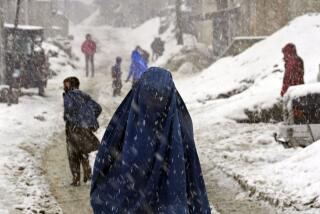Aid Plan May Displease Pakistan
- Share via
The Bush administration will offer Pakistan, a key U.S. ally in the war against terrorism, an aid package that falls short of what the Muslim country had sought to help its financially strapped apparel and textile sector, according to sources in industry and government.
President Bush will discuss the multimillion-dollar package with Pakistan’s president, Gen. Pervez Musharraf, when the leaders meet today in New York.
The textile concessions were supposed to be part of an overall Pakistan package that is reported to contain at least $500 million for aid and debt relief as well as support for international loans through the U.S. Export-Import Bank and the Asian Development Bank. The U.S. also is backing a new loan for Pakistan through the International Monetary Fund and already has given the South Asian country $100 million in direct aid along with lifting economic sanctions.
With the U.S. economy teetering on the edge of recession, the battle over Pakistani textiles has become one of the most vexing issues facing the administration. It pits the interests of a powerful Southern industry that is solidly Republican against the needs of a crucial ally in the campaign against Osama bin Laden.
Textiles are Pakistan’s lifeblood, providing jobs for 60% of the industrial work force. The U.S. is Pakistan’s top customer. It imported $1.9 billion worth of Pakistani textiles and apparel last year.
As part of the package, the administration will offer Pakistan limited expansion of quotas on such items as cotton sheets and pillowcases but will not promise the reduction or elimination of as much as $100 million in import duties because of fierce opposition from U.S. producers, sources said.
Azfar Hasan, who buys apparel in Pakistan for companies such as Eddie Bauer, Tommy Hilfiger and Nike, called the U.S. government’s offer minimal and worth “absolutely nothing.” Pakistan’s apparel makers are bracing for a 65% drop in business and up to 25,000 layoffs in the coming months because of the war against terrorism, Hasan said. He warned that the news could inflame anti-American sentiments in his country and weaken support for Musharraf, who faces strong criticism for supporting the U.S.-led bombing of Afghanistan.
“President Musharraf is walking a very fragile line,” Hasan said in a phone interview from the eastern city of Lahore. “There are groups that have interests, and they are trying to destabilize the situation. This works to their advantage--to have people unemployed and out on the streets without food and shelter.”
Critics have complained that the administration is allowing its security interests to be held hostage by a small Southern industry that can’t compete with lower-cost producers abroad. Brenda Jacobs, counsel for the U.S. Assn. of Importers of Textiles and Apparel, said U.S. retailers need tariff reductions to offset the financial risks and increased cost of doing business in Pakistan, which is the fourth-largest supplier of textiles and apparel to the U.S.
Carlos Moore, executive vice president of the American Textile Manufacturers Institute, said Friday that he was “pleased” that the administration had decided not to take a step that would “be extremely damaging” to domestic apparel makers, who have already lost 90,000 jobs in the past 18 months. Instead, the industry has urged the U.S. to eliminate duties on Pakistan-made hand-knotted rugs and work gloves, for which there is no domestic competition.
More to Read
Sign up for Essential California
The most important California stories and recommendations in your inbox every morning.
You may occasionally receive promotional content from the Los Angeles Times.













